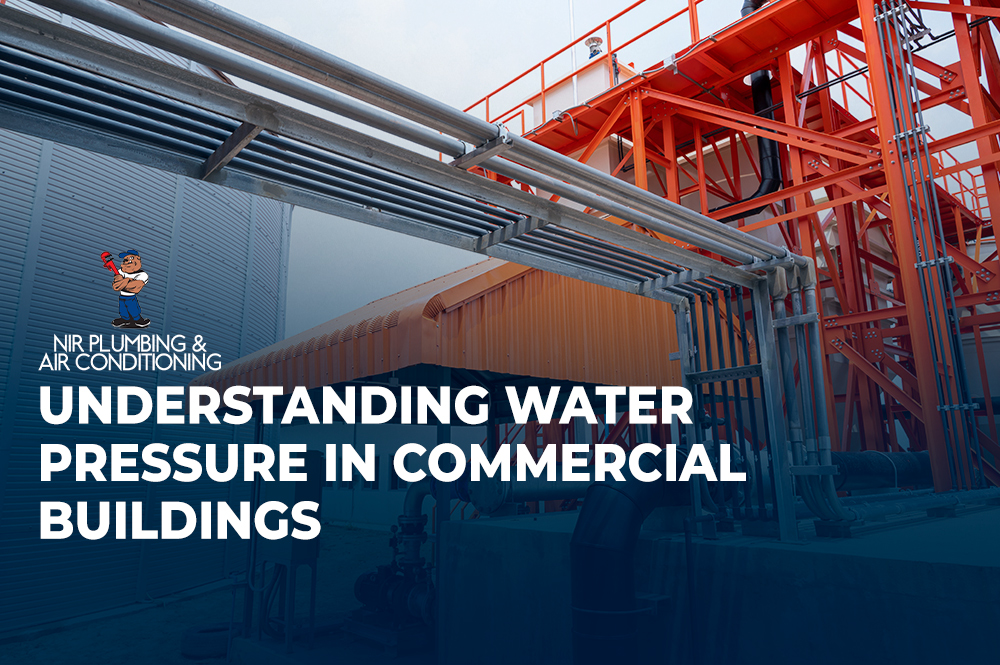Overview: Have you ever given much thought to the subject of water pressure in your commercial building? If not, maybe it’s time you should! Believe it or not, understanding water pressure can be quite fun! Read on for some info!
Water pressure is something that most of us take for granted in our everyday lives. We turn on the faucet and, if all goes well, water comes out at a reasonable pressure. But have you ever wondered how water pressure works in commercial buildings?
Water pressure is a critical component of a commercial building’s plumbing system. It’s the force that moves water through pipes and into faucets and fixtures. In commercial buildings, water pressure is often higher than in residential buildings due to the increased demand for water.
Today, we’ll dive into the world of water pressure and explore the basics of how it works in commercial buildings.
Why Water Pressure in Commercial Buildings Is Important
Let’s start with the basics: Why is water pressure important? If your commercial building utilizes water on a daily basis, you’re well aware of how important the water pressure is. Businesses such as restaurants, gyms, hotels — to name a few, have a high demand for water.
Water pressure is essential for proper water flow throughout a commercial building. If the water pressure is too low, it can result in slow water flow and reduced effectiveness of the water. On the other hand, if the water pressure is too high, it can damage pipes and fixtures.
So how do you measure water pressure? Water pressure is measured in pounds per square inch (PSI). Most commercial buildings require a water pressure measurement of at least 40-60 PSI to ensure proper water flow. You can measure water pressure using a pressure gauge that attaches to a hose bib or spigot.
>> Related Reading: What Is a Pressure Gauge?
Pipe Size and Water Pressure in Commercial Buildings:
The size of pipes is one of the primary factors that affect water pressure in commercial buildings. Commercial buildings often have larger pipes than residential buildings, which allows water to flow more easily and increases water pressure. However, pipe size isn’t the only factor that affects water pressure in commercial buildings.
>> Related Reading: The Different Types of Plumbing Pipes Used in Commercial Buildings
Height of the Building and Water Pressure in Commercial Buildings:
Here’s a science lesson: Water pressure decreases as water travels upwards, so the height of the building is another important factor to consider.
The higher the building, the lower the water pressure will be on upper floors. This is because the weight of the water above puts pressure on the water below, and the further the water has to travel, the more pressure it loses. To solve this problem, booster pumps are often used in commercial buildings to increase water pressure on upper floors.
Booster Pumps and Water Pressure in Commercial Buildings:
Booster pumps are installed in commercial buildings’ water systems to increase water pressure as it travels upwards. These pumps work by adding pressure to the water as it flows through the pipes. By doing so, booster pumps ensure that water pressure is consistent throughout the building — no matter which floor you’re on!
Demand and Water Pressure in Commercial Buildings:
The demand for water can vary significantly in commercial buildings, and this can affect water pressure. For instance, in an office building, hundreds of people may be using water at the same time, which can put a strain on the water system and cause water pressure to drop. To ensure that there is always enough water available to meet the demand, commercial buildings should invest in larger water tanks or multiple tanks.
>> Related Reading: How to Maintain Water Pressure in High-Rise Buildings
Importance of Understanding Water Pressure in Commercial Buildings:
Understanding water pressure in commercial buildings is crucial because it can affect the performance of plumbing fixtures and appliances. If the water pressure is too low, it may take longer to fill up a sink or bathtub — and if it’s too high, it can damage plumbing fixtures and appliances over time.
By understanding the factors that affect water pressure and taking steps to optimize it, building owners and managers can ensure that their water systems are operating efficiently and that their tenants are happy with the water pressure.
In Summary
Water pressure is an essential part of any commercial building’s water system. By considering factors such as pipe size, building height, and demand — and investing in booster pumps — building owners and managers can optimize water pressure and ensure that the water system is operating at its best. Optimizing water pressure is crucial for ensuring that tenants have reliable access to water and that plumbing fixtures and appliances are working correctly.
NIR Plumbing can help you with water pressure problems in commercial buildings as well as residential buildings. Our team of experts has the experience and equipment to diagnose the problem and find a solution that works for you. Contact us today to schedule a consultation!


